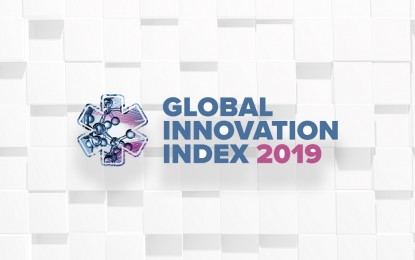
MANILA – The Philippines posted a big jump in the 2019 Global Innovation Index (GII) to 54th place from the previous year’s 73rd position as it catches up with world leaders, marking its first innovation achiever position.
Based on this year’s report, which gathered data from 129 economies, the country is among those that posted notable improvements, along with few Asian countries such as Vietnam, Thailand, and India.
With a total score of 38.18 over 100, the report said the Philippines is among the countries that have “above expectations for level of development” among lower middle income economies.
It ranked 13th among South East Asian and Oceania countries and 76th in the world on the innovation input sub-index after getting a score of 41.68 points, which, however, remains below the median score of 43.46.
In terms of the innovation output sub-index, the country ranked 42nd in the world and 10th in the region after getting a score of 30.68, higher than the 23.54 median score.
Among those belonging to the lower middle-income economies, the Philippines landed on the 6th position for the 10 best-ranked economies on the GII, behind Vietnam, Ukraine, Georgia, India, and Mongolia.
The report said the Philippines is among the innovation achiever in this year’s report after posting an above average scores in all innovation dimensions, except on market sophistication.
“It has remarkable performance in Knowledge diffusion and Knowledge absorption, not only relative to its income group and geographic region, but also relative to all other economies assessed in the GII,” it said.
It said that the country “also displays relatively good scores for over half of the selected indicators, achieving second in Trademarks and third in Females employed with advanced degrees, High-tech imports, and Creative goods exports.”
In terms of the Knowledge and technology outputs the country ranked 31st.
The report said “data for indicator High-tech net exports became available this year and the country ranks 1st.”
It said the Philippines also improved on other indicators, and is included among the top 10 best namely on firms offering formal training (9th), productivity growth (10th), ICT services exports (8th), and Creative goods exports (8th).”
The report, on the other hand, noted that amid these improvements the country faces several weak areas on the innovation input side.
Specifically, these are in ease of starting a business, ease of getting credit, expenditure on education, and Global R&D (research and development) companies while on the output side the notable weakness is on scientific and technical articles and new businesses.
With these findings, the report explained that despite the slower economic outputs, some countries are showing resiliency and are doing their best to cope up and achieve economic and social developments.
“Despite this gloomy perspective, innovation is blossoming around the world. In developed and developing economies alike, formal innovation -- as measured by research and development (R&D) and patents -- and less formal modes of innovation are thriving,” it said.
The report said governments around the globe have increased the use of intellectual property in their quest for innovation, with investments on R&D growing more than double between 1996 and 2016.
It said R&D expenditures of governments around the world rose by 5 percent while business R&D expenditures went up by 6.7 percent, the biggest jump since 2011.
“Never in history have so many scientists worldwide labored at solving the most pressing global scientific challenges,” it said.
The results of the GII 2019 shows that R&D spending of some high income economies “are growing slowly or not at all” since public support for this, particularly in high income economies is declining “given its central role in funding basic R&D and other blue sky research, which are key to future innovations -- including for health innovation.”
It also said that “increased protectionism -- in particular, protectionism that impacts technology-intensive sectors and knowledge flows -- poses risks to global innovation networks and innovation diffusion.”
“If left uncontained, these new obstacles to international trade, investment, and workforce mobility will lead to a slowdown of growth in innovation productivity and diffusion across the globe,” it added.
The GII is a joint publication of Cornell University, one of the world’s graduate business school, INSEAD and the World Intellectual Property Organization. (PNA)
